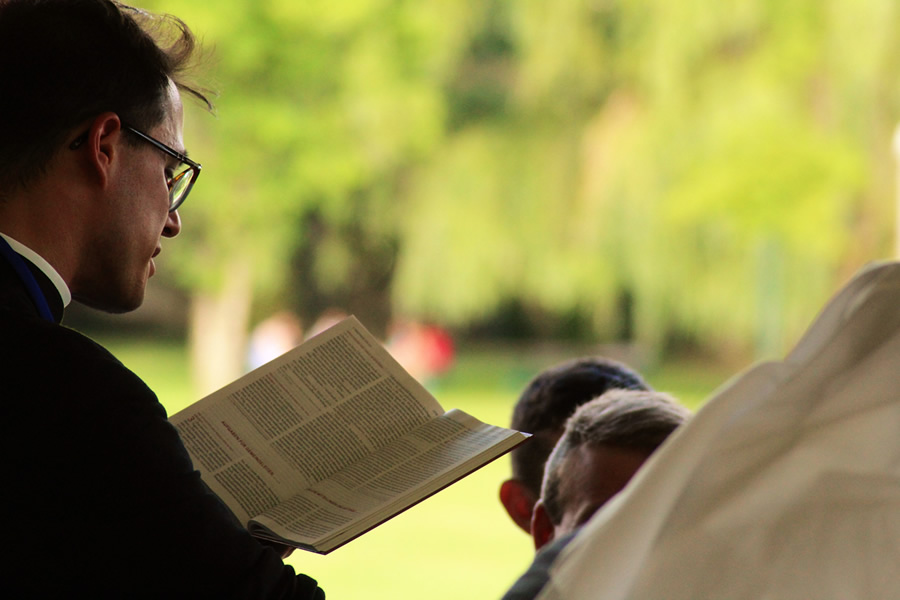Blog & Pastor Letters

Third Sunday in Ordinary Time – January 21, 2024
01-21-2024Weekly ReflectionFr. Christopher TrummerLike last Sunday, our readings this Sunday again have a theme of vocation. Today, however, the emphasis is on the urgency of obeying God’s call. In the story of Jonah, God gives Jonah the apparently impossible task of calling the entire large city of Nineveh to repentance. Jonah was both the most reluctant prophet in history and the most successful. No other prophet resisted his calling more, but also, no other prophet saw greater fruit when delivering God’s message.
The story of Jonah illustrates that, while God uses us as His instruments, His will ultimately is not thwarted by our disobedience. We need to cooperate with His will as much as possible, but He determines the outcome, and we are foolish if we attribute our success to our own efforts. As St. Paul said, “Neither the one who plants nor the one who waters is anything, but only God, who causes the growth” (1 Cor 3:7).
There is one phrase in this first reading that always merits some explanation. After the people of Nineveh fasted and turned away from evil, we are told that God “repented of the evil that he had threatened to do to them; he did not carry it out.” There are other places in the Old Testament where God is described as changing His mind or regretting some action of His. What are we to make of this? This really is not a theological problem. First, in the drama of the storytelling, the human authors of the Scriptures sometimes anthropomorphize God by attributing certain human emotions and moods to Him. God does not literally have such emotions, but He is not disinterested—He is personally involved in His creation and engages us with loving concern.
Second, when God threatens some punishment, Scripture sometimes describes the punishment as inevitable when in reality it is conditional. The case of Nineveh is a perfect example: God’s literal message to them through Jonah was, “Forty days more and Nineveh shall be destroyed.” It seems hopeless. However, the fact that God did not destroy Nineveh shows that His original threat was actually conditional upon their repentance. In order to highlight God’s mercy in response to their repentance, the sacred author describes God as “repenting of the evil he had threatened.” The simple but powerful point is that God’s mercy is conditional upon our repentance. God Himself does not change, but our ability to receive His grace and mercy does change depending on our disposition. Another powerful lesson from Nineveh is that the time to repent and convert is always now. The present moment is all that we have — “later” is not a reality or something guaranteed to us. In St. Paul’s words, “Behold, now is a very acceptable time; behold, now is the day of salvation” (2 Cor 6:2).
In both the second reading and the Gospel, we see that the ability to follow God’s will is dependent upon detachment. St. Paul tells the Corinthians about the urgency of salvation and presents five paradoxes: they should marry, weep, rejoice, buy, and use the world as if they were not doing these things. This sounds strange — what does Paul mean? Certainly, he cannot mean that Christians should simply abandon these things altogether. Rather, he is urging them to set their hearts on God and eternal life. Even the best things in this life, such as marriage, are only temporary. The only realities that will remain with us into eternity are God, ourselves, and our relationship with Him. When we treat the passing things of this life as if they had ultimate or lasting importance, we make them idols and expect a happiness from them which they simply cannot provide. This leads to attachments and addictions. But when we love the Lord our God with all our heart, all our being, and all our strength, we are free to enjoy the good things of this life in a healthy way, as blessings of God and signs to us of His goodness. As Christ himself says, “Seek first the kingdom of God and his righteousness, and all these things will be given you besides” (Mt 6:33).
In the Gospel, we see that the first disciples, while certainly far from perfect, were apparently detached enough from their identity and livelihood as fishermen that they were able to leave this behind the instant that Christ called them. For James and John, who were probably only teenagers, this also meant leaving their own father behind. Was their father important to them? Absolutely. Did they love him? Undoubtedly. But God is the most important thing. Although they hadn’t yet heard this teaching, James and John were literally observing Christ’s words, “Whoever loves father or mother more than me is not worthy of me” (Mt 10:37). This message is very challenging to many people. The key to accepting it is to trust that, however painful it may be at times, doing God’s will always enables us to love the people in our life even more. If anything or anyone stands in the way of us following God completely, we need to reevaluate our relationship with that thing or person.
BACK TO LIST